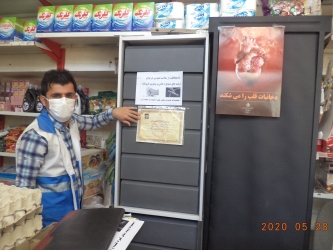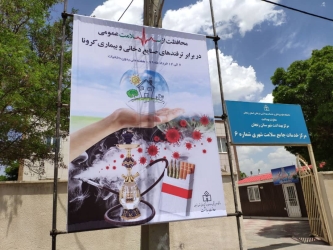Introduction
 Iran’s Ministry of Health and Medical Education is ramping up health awareness activities during the critical period of the COVID-19 pandemic. It is well-established that COVID-19 selects its victims from among individuals with pre-existing conditions, particularly those caused by tobacco use. Furthermore, evidence indicates that smoking waterpipes plays the role of a vehicle for COVID-19 transmission. Augmenting public awareness is key as well as tobacco control actions on a regular basis about this link to reduce the burden of COVID-19. It is also essential to avert the tobacco industry efforts to disseminate misinformation to broaden its market. Accordingly, the Ministry is focusing, within tobacco control, on two areas: enforcing a ban on waterpipe use in public places and a nationwide tobacco free initiative.
Iran’s Ministry of Health and Medical Education is ramping up health awareness activities during the critical period of the COVID-19 pandemic. It is well-established that COVID-19 selects its victims from among individuals with pre-existing conditions, particularly those caused by tobacco use. Furthermore, evidence indicates that smoking waterpipes plays the role of a vehicle for COVID-19 transmission. Augmenting public awareness is key as well as tobacco control actions on a regular basis about this link to reduce the burden of COVID-19. It is also essential to avert the tobacco industry efforts to disseminate misinformation to broaden its market. Accordingly, the Ministry is focusing, within tobacco control, on two areas: enforcing a ban on waterpipe use in public places and a nationwide tobacco free initiative.
Ban on waterpipes in public places
The Attorney General issued a circular banning the use of waterpipes in public places to limit the spread of COVID-19. The Attorney General increased the penalty in cases of violating the ban from a fine to closure of cafés. The initiative was supported by the National Task Force for Fighting Coronavirus. Police forces have sealed by court order about 16 000 violating places including teahouses.
The Ministry of Health and Medical Education has also provided a number for people to report violations of the ban on tobacco use and ensuring that all public places put a sign stating that tobacco use is not allowed.
Nationwide tobacco free initiative
 The Ministry of Health and Medical Education, following a Results-Based Management approach, is taking forward a nationwide initiative covering 65 Iranian cities and 63 villages to become tobacco free throughout the country’s 33 provinces. The initiative which started in 2020, coinciding with the COVID-19 pandemic, focuses on the MPOWER strategy of reduction in both demand and supply. It aims at increasing advocacy, creating public awareness and establishing a comprehensive multisectoral coordination mechanism with the engagement of all stakeholders such as nongovernmental organizations and civil society through universities of medical sciences, hospitals and other educational, cultural and sporting facilities. There are existing gaps in the implementation of the 2007 Executive Bylaw of Comprehensive Act on National Control and Campaign Against Tobacco, which prohibits tobacco consumption in public places. Accordingly, this initiative encourages the various bodies to develop a plan to become tobacco free, using a template developed as part of the initiative.
The Ministry of Health and Medical Education, following a Results-Based Management approach, is taking forward a nationwide initiative covering 65 Iranian cities and 63 villages to become tobacco free throughout the country’s 33 provinces. The initiative which started in 2020, coinciding with the COVID-19 pandemic, focuses on the MPOWER strategy of reduction in both demand and supply. It aims at increasing advocacy, creating public awareness and establishing a comprehensive multisectoral coordination mechanism with the engagement of all stakeholders such as nongovernmental organizations and civil society through universities of medical sciences, hospitals and other educational, cultural and sporting facilities. There are existing gaps in the implementation of the 2007 Executive Bylaw of Comprehensive Act on National Control and Campaign Against Tobacco, which prohibits tobacco consumption in public places. Accordingly, this initiative encourages the various bodies to develop a plan to become tobacco free, using a template developed as part of the initiative.
Way forward
The Ministry of Health and Medical Education is looking to continue the ban on waterpipes after the pandemic subsides. The Ministry continues to advocate for the ban at every opportunity. Engineer Behzad Valizadeh, Head of the Secretariat of the National Tobacco Control Headquarters, stated: “We would like to use the momentum created by COVID-19 to continue sustainable waterpipe elimination even beyond COVID-19”. Future plans include further expansion of the tobacco free initiative across Iran.
Related links
Ban on waterpipes in public places
Efforts to turn Sadeghabad Golestan into a tobacco-free city
Iran’s Ministry of Health and Medical Education website


